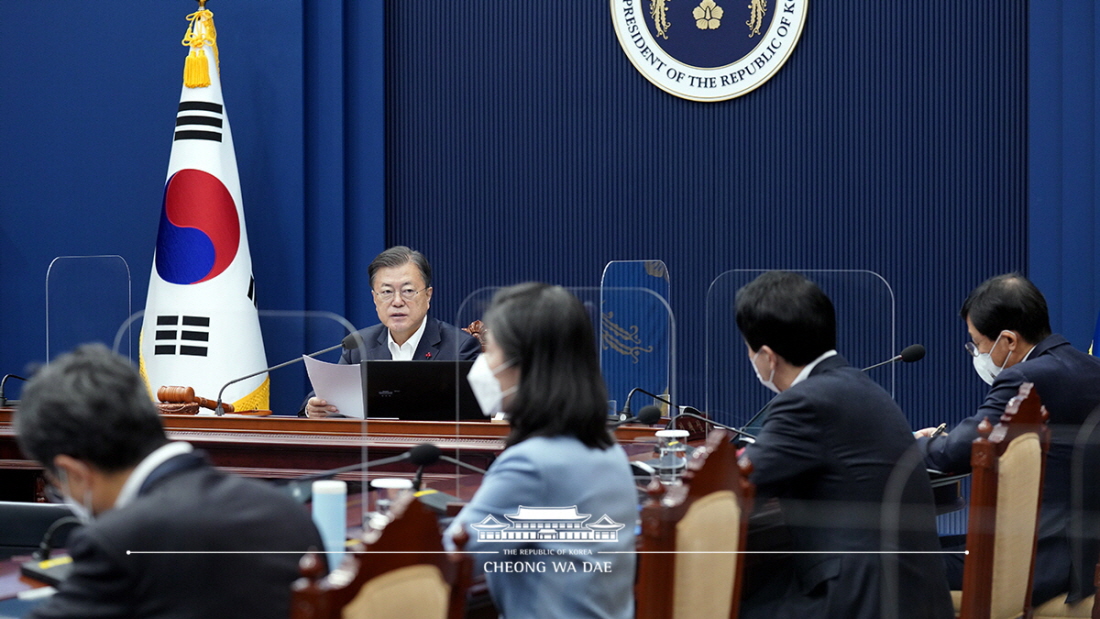이 웹사이트는 제19대 대통령 임기 종료에 따라 대통령기록관이 「대통령기록물 관리에 관한 법률」에 의해 이관받아 서비스하는 대통령기록물입니다. 자료의 열람만 가능하며 수정 · 추가 · 삭제는 불가능합니다.
다만, 「개인정보보호법」에 의하여 개인의 정보를 보호받기 원하시는 분은 관련 내용(요청자, 요청내용, 연락처, 글위치)을 대통령 웹기록물 담당자(044-211-2253)에게 요청해 주시면 신속히 검토하여 조치해 드리겠습니다. 감사합니다.
SPEECHES & REMARKS
BRIEFINGS

Let me begin the 55th Cabinet Meeting.
Time has slipped by and we are now only ten days away from the end of this year. It is regrettable that, following last year, we must yet again have a difficult year-end due to COVID-19. I am grateful to the people and medical professionals who have long fought COVID-19 to the best of their abilities. I’d like to ask everyone to continue to overcome hardships by encouraging one another and pulling together.
The responsibility of the Government has become even heavier, and its role has also become very important. We have to soberly review and learn from what has been deemed lacking in our preparations for starting the return to normal life. Our anti-epidemic policy measures must be firmly reorganized to brace for yet another start of returning to normal.
First, while putting stringent epidemic prevention measures in place, we have to do everything possible to bring the COVID-19 situation under control as early as possible. In particular, cases of severely or critically ill patients must be curbed. Our recent experience attests to the fact that COVID-19 can spread at any given time if there is the slightest breach. Mindful that the Omicron variant might become the dominant coronavirus strain, we must also make needed preparations.
We have to remember that gradual and cautious steps must be taken to return to normal life – as if knocking on a stone bridge before crossing it. More than anything else, the centerpiece of the reorganization of our epidemic prevention efforts is to ensure that the medical response system is reinforced. An increase in confirmed cases can accompany the return to normal daily routines to some degree. For this reason, the medical system’s ability to protect and treat infected patients under any circumstances must be guaranteed first.
In particular, no shortages should occur when treating severely or critically ill patients as the number of confirmed cases increases. The key is to secure a sufficient number of hospital beds and medical personnel. We have steadily increased the number of beds and medical professionals, but this has not been enough. Among other issues, coping with the increased number of severely or critically ill patients has been difficult. Going beyond the current plan the Government is pushing to secure additional beds, we need extraordinary, entirely new measures. I urge you to mobilize all available national university hospitals and public medical resources in order to significantly increase hospital rooms and secure additional medical personnel as early as possible.
I ask related ministries and agencies to team up with the private sector and launch taskforces to take on their missions with exceptional measures and determination. The fiscal authorities should stand behind them with unsparing support. Speed matters the most. People’s lives depend on the securing of beds. I also urge you to bear in mind that the later we return to our normal lives, the greater the damage to people’s livelihoods.
Cooperation from private hospitals is also urgently needed. Many private medical institutions are working together. A growing number of hospitals are offering all of their beds for the treatment of confirmed COVID-19 patients. Neighborhood clinics are also actively taking care of these patients, including those being treated at home – for which I am truly grateful. In this time of national difficulty, I ask the public and private sectors to join forces to ensure that all of their medical capabilities are mobilized to protect the people’s lives and safety.
The encouraging news is that the pace of vaccinations is gradually accelerating. Most of all, the rate of administering booster shots is sharply increasing. A booster shot not only dramatically enhances immunity but also has proven extraordinarily effective in preventing severe or critical symptoms and death in particular. It is also known to be effective in defending against the Omicron variant. If the current trend holds and the pace of administering booster shots rises, this will likely contribute greatly to reducing COVID-19 risks and increasing our ability to provide needed medical care.
It is also very encouraging that the idea of vaccinating children and adolescents is gaining more acceptance and that more and more of those aged 18 and older who are not vaccinated are getting inoculated. Regardless of age and social status, it is becoming a firmly rooted perception that vaccination is the most effective defense for keeping each other safe.
The successful return to daily routines lies down a path never taken. We may encounter unexpected difficulties at any time. However, we will not make the same mistakes again. We will turn this brief pause into an opportune time to move forward.
Trials are what make success possible. We will make it through this critical juncture and surely succeed in restoring daily routines. I urge all the ministries and agencies to come together as one and do all you can with extraordinary determination.



